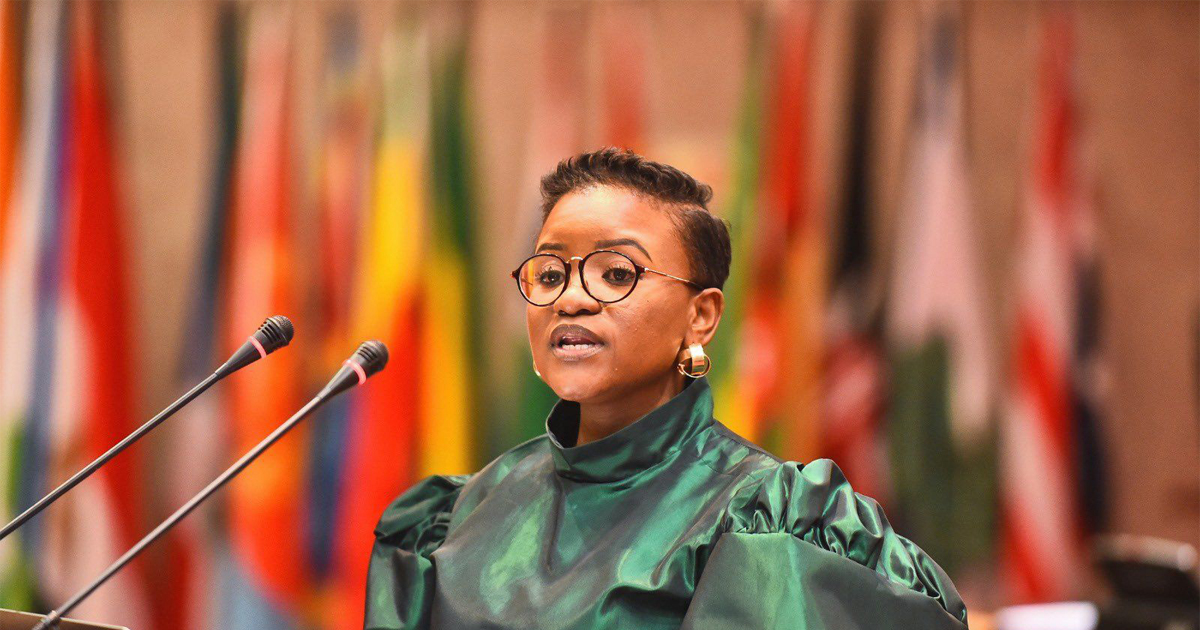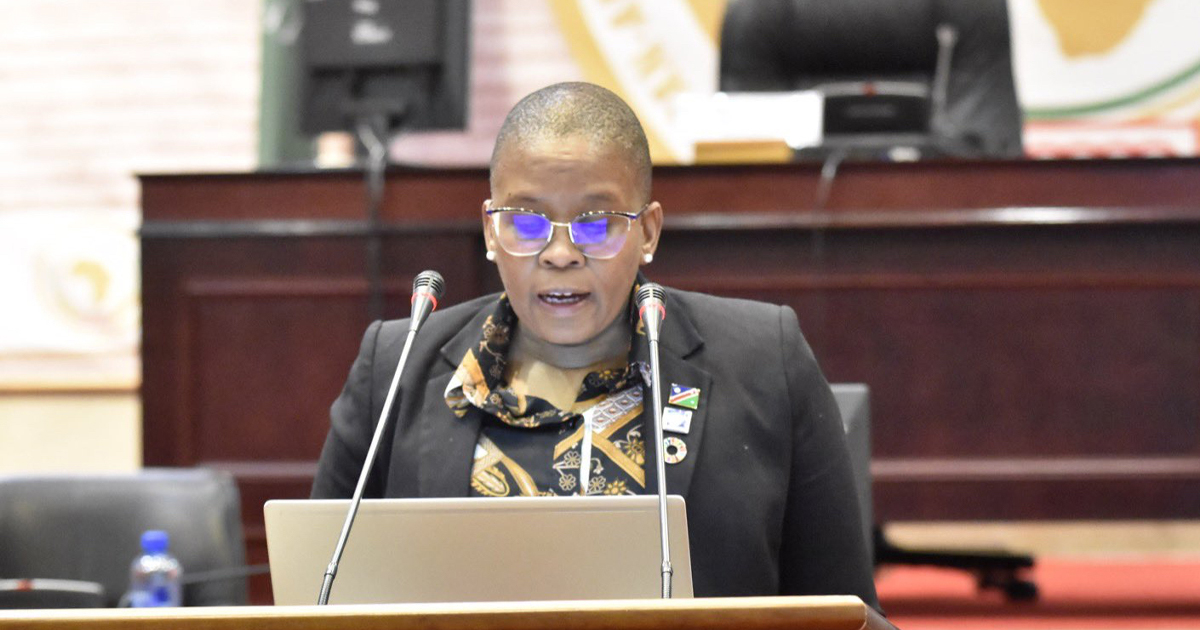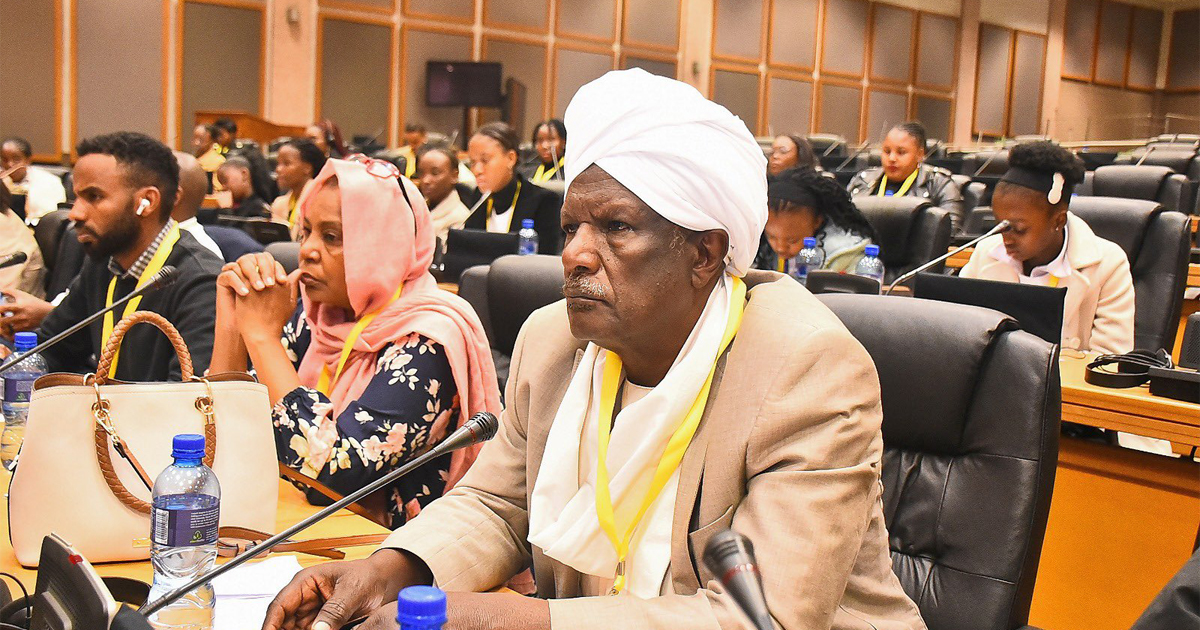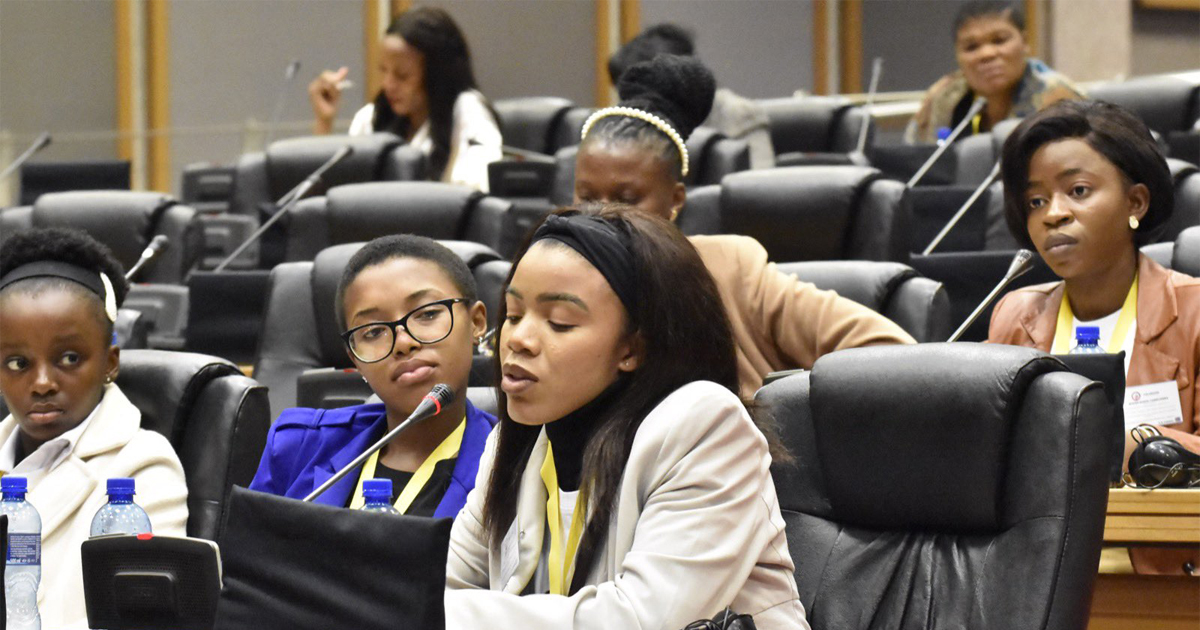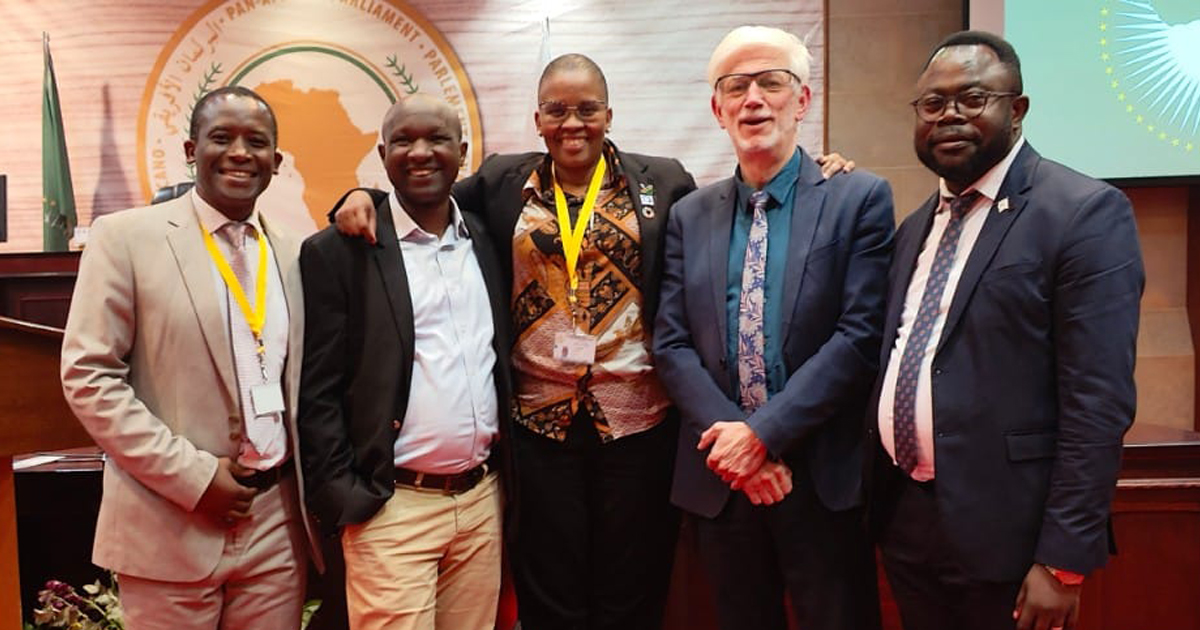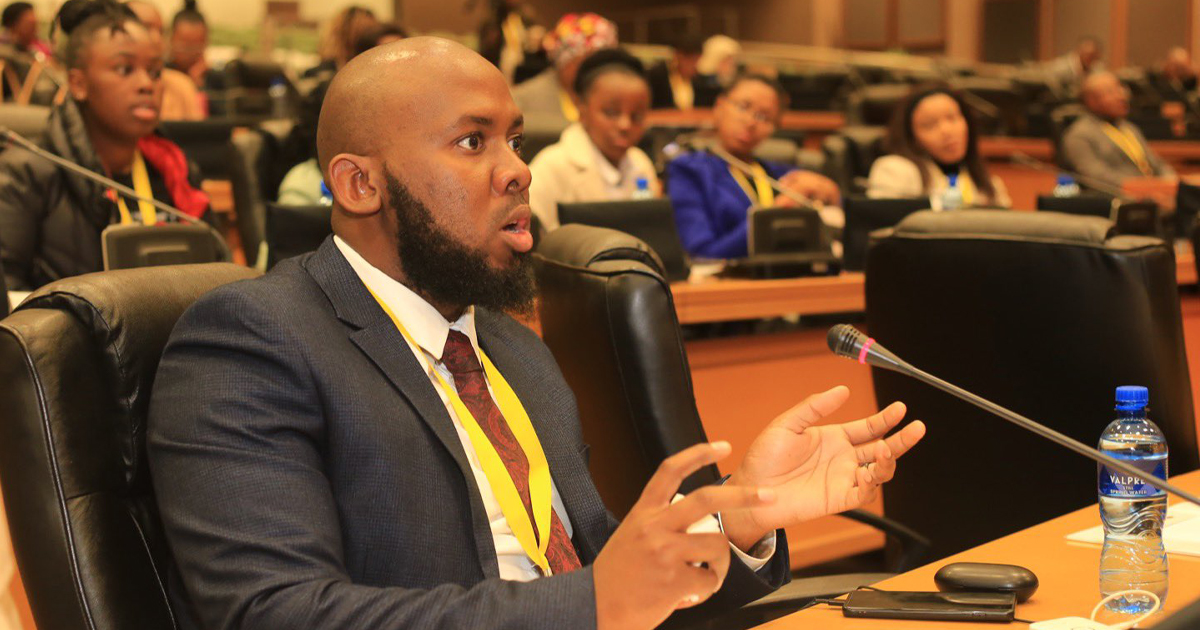At an historic meeting on 19 May 2023 at the Pan African Parliament (PAP), in Midrand, a group of civil society organisations, under the umbrella of the PAP Civil Society Organisations (CSO) Forum, for the first time formally met with Members of the PAP (MPAPs) in a Parliamentary Dialogue as part of the PAP’s May 2023 ongoing session. The meeting signalled the recognition by the PAP of the importance of civil society, and the ambition of the PAP to be a genuine peoples’ parliament. The PAP CSO Forum PAP presented recommendations to the MPAPs pertaining to the relationship between the PAP and civil society, human rights, peace and security, the Free Movement of Peoples Protocol and the Malabo PAP Protocol. MPAP Pemmy Majodina, Chief Whip of the ANC, chairing the Parliamentary Dialogue, undertook that the recommendations would be further discussed by the relevant PAP Committees, and that part of the PAP’s next session would be devoted to discussing them.
Recommendations from CSO Forum to the PAP
On the relationship between civil society and the PAP, the PAP CSO Forum called on the PAP to institutionalise the Parliamentary Dialogue between the PAP and the PAP CSO Forum as a regular feature of all PAP’s sessions. It further called on PAP to develop and institutionalise other mechanisms and processes through which CSOs can meaningfully, constructively and consistently be engaged in the sessions and committee meetings of the PAP. Lamenting the lack of access to information about the PAP, the PAP CSO Forum called on the PAP to enhance its visibility and to ensure the wide and timely dissemination of information on its structures, mandate and activities, in particular a record of its deliberations (Hansard), and its recommendations and resolutions, to facilitate for increased understanding and meaningful engagement by African citizens in the work of the PAP. The PAP CSO Forum requested the PAP without delay to place the names and contact particulars of all MPAPs, per country, on the PAP’s website, together with each MPAP’s designation to relevant committees.
The PAP CSO Forum expressed serious concern about peace security in Africa. It called on the PAP to leverage its moral authority to ensure that the trend of term elongation and constitutional tampering is halted at national levels; and called on the PAP to use its authority to ensure that conflicts, especially ones that threaten regional stability (for example, in the Sahel, Great Lakes-Eastern DRC, Cabo Delgado, and Sudan-The Horn) are addressed urgently in a holistic manner to bring about lasting peace in these theatres of war. It further called on the PAP to support the clarion call by African to halt the war in Sudan and ensure that the leaders of the warring factions immediately subject themselves to peace talks, thus delivering on the mantra of African solutions for African problems. On Zimbabwe, the PAP CSO Forum noted that the situation requires a multilateral solution and that regional bodies such as SADC, PAP and AU have an obligation to ensure that Zimbabwe goes back to basic principles of fair government.
As for human rights-related matters, the PAP CSO Forum called on the PAP to encourage all State that have not yet done so, to ratify the following AU human rights treaties: the African Charter; Maputo Protocol; Protocol to the African Charter on the Rights of Older Person in Africa; Protocol to the African Charter on the Rights of Persons with Disabilities in Africa; and the Protocol to the African Charter on the Rights of Citizens to Social Protection and Social Security; African Court Protocol and made a please for state parties to the Court Protocol to make the optional declaration under article 34(6) of that Protocol, allowing direct individual access to the Court.
The PAP CSO Forum urged the PAP to work with African CSOs to advance the goals of PAP being transformed into a legislative body with full legislative powers within the next 10 years, as part of its 20th Anniversary celebrations in 2024, and as a vision for the third decade of its existence.
In one of its recommendations, the CSO Forum also urged the PAP to ensure that member states embrace the philosophy of free and safe movement of Africans within Africa, and to ensure that the required ratifications are obtained to bring the Free Movement of Peoples Protocol into force by 2024.
CSO Forum
The Centre for Human Rights, Faculty of Law, University of Pretoria, and the PAP, working with civil society partners from across the continent, established the PAP CSO Forum to enhance the capacity of CSOs engagement with the PAP. The PAP CSO Forum is a platform aimed at fostering closer collaboration between and among CSOs and with the PAP in order to ensure avenues for greater involvement and collaboration. It further aims to enhance the PAP’s visibility and improve people’s level of appreciation of its mandate and role.
While the CSO Forum, and CSOs more generally, have been engaging with the PAP, these engagements have been with the various committees and took place on an ad hoc basis. The 19 May Parliamentary Dialogue was organised by the Centre for Human Rights, in partnership with Open Society Foundation. The meeting brought participants from various civil society organisations in Africa and members of academia, together with around 75 MPAPs.
The Parliamentary Dialogue was preceded by the sixth meeting of the PAP CSO Forum. The theme for discussion was Violent Conflict in Africa: Geopolitical Implications and Impact on Africa’s Democratic Agenda. This theme was developed under the context of Africa being attached to the stigma of a ‘Continent at war with itself’ with many states grappling with armed conflict. The continent has hosted, and continues to be home to, several deadly conflicts that jeopardise human, national, and international security and defy efforts to resolve them.
CSO presentations and discussion
The plenary discussions focused on the geopolitical implications of violent conflict in Africa, with a specific focus on assessing the impact of violent conflict on democratic values and processes with focus on Sudan, Tunisia and Zimbabwe, and unpacking the efficacy of the AU principles on peace and security. “We must work with all members of the PAP to ensure the relevance, credibility and transparency of the institution so it delivers on its mandate for the African people. The continent needs an effective PAP in the face of the challenges Africa faces. But it must tackle those challenges carrying the voices and aspirations of its constituents from where Members derive their direct authority” said Jeggan Grey-Johnson, Advocacy and Communication Officer at Open Society Foundation.
While peace and security are indispensable foundations for economic development and an integrated Africa, the existing violence, trans-organised crime and civil wars on the continent affect peace and stability in Africa. The existing constellation of conflict in Africa is an indisputable fact about the fragility of peace and security in the continent. This quagmire, as well as other concerns, should be prompting the AU and its organs to take steps to stop the persistent fights and address cases of relapse into violence in some parts of Africa.
A gendered perspective on conflict and peace in Sudan underscores the underrepresentation of women in peace processes. Zainab Olaitan, a Project Officer from the Centre for Human Rights, emphasised that “a gendered perspective to Peacebuilding will ensure equal participation of men and women in peace processes; increased number of women in peace support operations; involving women and women organisations that engage in peace work. As a result of this, there can be operational effectiveness, legitimacy and sustainability of peace agreement and peace sought”. The presentation also touched on the human security concerns arising from the Sudan conflict while calling for a human-security centred approach to resolving the conflict. Additionally, women often suffer the most during conflict hence they must be included in the peace process. Resolution to the conflict must be human security-centred and gender responsive.
Tatenda Mazarura, speaking on Zimbabwe, highlighted that unless and until the region takes courageous steps to properly understand the nature of the Zimbabwe regime, especially its obstinacy towards justiciable government, it is only a matter of time before this bomb ticks off with devastating consequences for regional peace and stability. The Zimbabwe problem requires a multilateral solution and regional bodies such as SADC, the Pan-African Parliament and the African Union have an obligation to ensure that Zimbabwe goes back to basic principles of fair government. It is in the region and indeed the continent’s best interests to address the Zimbabwean question, but this requires much more than tokenistic interventions and an urgent need to appreciate the regional ramifications of the misgovernance in Harare before it is too late.
Liesl Vaudran, Senior Advisor at African Union International Crisis Group, speaking on the AU principles on peace and security in Sudan, pointed out the AU’s flaws in response to the Sudanese conflict. Vaudran argues that the AU’s weak response to the conflict is due to the shifting global landscape and undermining of multilateral solutions; the problematic relationship between the AU and Regional Economic Communities; and the fairly weak role of the AU Peace and Security Council in this crisis.
CSO Forum-PAP Parliamentary Dialogue
The proceedings were opened by Fourth Vice President, Honourable Francois Ango Ndoutoume, who was later replaced by MPAP Majodina. The Acting Clerk of the PAP, Gali Massa Harou, moderated proceedings.
Minister Yvonne Dausab, the Minister of Justice in the Namibian Cabinet, gave a keynote address on the role of civil society in the promotion of democracy, human rights and security within the African Union institutional architecture. In her address she congratulated the PAP CSO Forum as a platform that enables engagements with the African Union for a better future for African Citizens. “CSOs must champion peace, development, growth, and unity across our continent. We need CSOs to commit towards assisting governments across Africa in creating better livelihoods for Africans’- said Minister Dausab.
Bonolo Makgale, the PAP CSO Forum Convener and Programme Manager at the Centre for Human Rights, noted that in this journey towards democratisation, the PAP plays a significant role. However, limited legislative powers and resources hinder its effectiveness. To overcome these obstacles, it is crucial for member states to empower the PAP by providing it with the necessary resources, granting it legislative authority. Additionally, strengthening the relationship between the PAP and CSOs is vital. The PAP should actively engage with CSOs, recognizing their expertise and leveraging their knowledge to inform legislative processes. Makgale posited that “as we reflect on the progress made and the challenges ahead, let us remember that this intricate dance between democracy and human rights is nothing short of a symbiotic relationship, each profoundly dependent on the other, and each providing sustenance to the other.”
Frans Viljoen, Director of the Centre for Human Rights, underlined the historical significance of the event, and expressed optimism that the Parliamentary Dialogue would become a regular feature of the PAP’s session. “The PAP CSO Forum looks forward to continuing engaging with the PAP on the various recommendations that were submitted during the Dialogue.” He also thanked those who made the event possible: “Our sincere thanks go to the PAP, and in particular to the Acting Clerk and the Legal Counsel, Clement Mavungu, for their support. With the Centre for Human Rights, Bonolo Makgale should be singled out. Working with her team, Bonolo’s singular talents, tenacity and perseverance were instrumental not only in establishing the PAP CSO Forum but also in making the first PAP-PAP CSO Forum Dialogue a memorable, meaningful and precedent-setting event.”
For more information contact:
Bonolo Makgale
Programme Manager: Democracy and Civic Engagement Unit
Tel: +27 (0) 12 420 4199
bonolo.makgale@up.ac.za
Ms Tariro Sekeramayi
Project Officer: Democracy and Civic Engagement
Tel: +27 (0) 12 420 4199
tariro.sekeramayi@up.ac.za
Yanga Malotana
Project Officer: Democracy and Civic Engagement
Tel: +27 (0) 12 420 4199
u18020322@tuks.co.za

